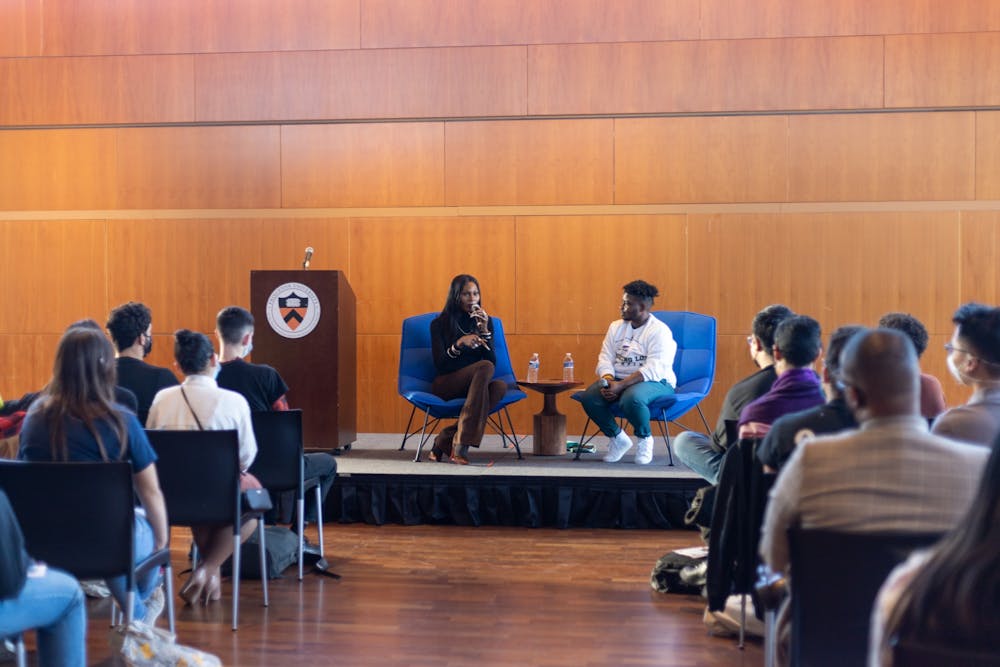Content Warning: Includes references to targeted violence.
To a room full of students, staff, and other attendees, “Pose” star Dominique Jackson welcomed a conversation on identity and perseverance at the Carl A. Fields Center for Equality and Cultural Understanding on Nov. 18.
As part of the Trans Week of Remembrance series, the conversation was hosted jointly by the Gender and Sexuality Resource Center (GSRC), the Gender and Sexuality Studies program, and the Office of Religious Life (ORL), and moderated by Communications Manager for the Transgender Law Center K Richardson.
After introductions by Assistant Dean of the Office of Diversity & Inclusion Kristopher Oliveira and Assistant Director of the GSRC Eric R. Anglero, Richardson encouraged those in attendance to participate in a moment of silence to honor the loss of members of the trans community.
Richardson then encouraged Jackson to share her story of how she came into herself as a trans woman, a queer activist leader, and a successful model and actress.
“From the age of four, [my parents] had to explain to me why I wasn’t a girl,” she said.
Jackson was born in Trinidad and Tobago, and said at the event that the culture of her home island impeded her self-expression.
“In their head, [my parents] were teaching me a lesson,” she said, referencing her parents’ insistence that Jackson was not transgender. “They were doing what they thought as parents was the best thing they could do for me.”

Over time, Jackson said, she came to realize that her identity could persist without disrespecting those around her. She went on to enter the modeling industry, inspired by models like Naomi Campbell and Tyra Banks to persevere in the face of adversity. Still, it was a mixed sense of pain and courage that later helped her break out into the acting industry.
“I watched Angela Bassett play Tina Turner,” she said. “And that was power for me.”
Jackson said that she was often doubted and looked down upon due to being transgender, but did not let this discourage her.
“Bring me your proof that I am not supposed to be me,” she said, speaking at those that would judge her lifestyle. “If you can’t bring me proof, please shut up and get out of my way.”

The audience engaged enthusiastically with Jackson, snapping and clapping when her points resonated.
When Jackson said she refused to live a life in limbo, rejecting uncertainty and questioning, the line “All of those ‘maybes’ were not for me; I didn’t even know bees came out in May,” pulled a laugh from the audience.
After asking Jackson about her support systems, Richardson shifted the discussion to “Pose.” A drama series that ran for three seasons on FX, “Pose” explores the ballroom scene in New York City in the 1980s. Jackson played the principal role of Elektra Abundance Evangelista, mother of the house of Abundance. Elektra is known for her quick wit and ability to “read anyone for filth” if they cross her.
Richardson emphasized this character, asking Jackson, “How much of Elektra is [your personality], and how much of [your personality] is Elektra?”
Jackson’s response was immediate: “Sometimes we are afraid of ourselves until we see it in someone else,” she said.
Elektra’s character is often cruel and selfish to achieve her own ends, something that Jackson emphasized has made her think introspectively.
“For my own happiness, I had to stop criticizing and judging others,” she said.
However, Jackson also brought up that Elektra reminded her of her own drive and determination.
“[Elektra] was the woman that said ‘By all means necessary, I will survive,’” she said. “And I will do it fabulously.”
Richardson then asked more broadly about Jackson’s experience working on “Pose.”
“It was bittersweet,” she said, explaining how her platform led her to feel validation, but also fear. She shared an anecdote about being on a train in Manhattan after the show aired, and a large man approaching her.
“He leaned over me and said, ‘Are you in that show?’” Jackson told the crowd. She’d panicked, worried she might be killed on the spot.
“And then he pulled back and he said ‘Good job,’” she said, and a sigh was heard in the crowd. “I got off at Lexington and I have never been back on the train ever since.”
After the laughter died down, Jackson continued about how her fame has penetrated every aspect of her private life.
She explained that she has received death threats from several outlets, including in person. At the beginning of “Pose,” Jackson hired a bodyguard to protect her in instances like those.
She told the crowd that the man she hired as her bodyguard is currently her fiancé, receiving applause and congratulations from the audience.
“For a trans woman to find a person that loved me, let me know love could exist,” she said. “Love is something that we should all be able to experience and feel safe doing so.”
Richardson ended their questioning portion of the conversation with a question about Jackson’s radiant personality.
“How do you put light into other people? How do you continue to find the strength to pour light onto others?” he said.
Jackson talked about her struggles in a past marriage, when she was dealing with her own identity and refusing help from others.
“I went through the fire, now I am the fire,” she said, eliciting a large positive response from the crowd.
Richardson then allowed three audience members to ask Jackson a question. Jackson answered questions about finding love as a young queer person of color, finding peace in stressful times, and her own spirituality.
The talk ended with Anglero presenting a shirt with a ‘P’ on it, shaded in with the trans pride flag colors. While handing her the gift, he said Jackson would be welcome back anytime.
Andrew Somerville is a staff writer who corresponds with and covers USG happenings and other campus news. He can be reached at jas19@princeton.edu.








